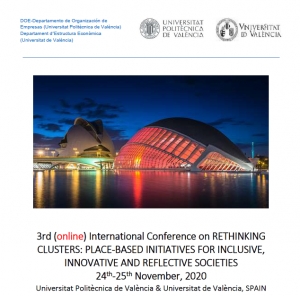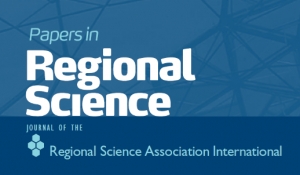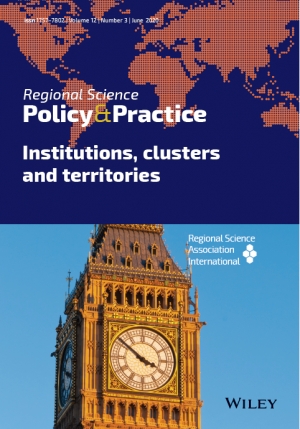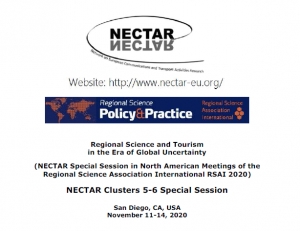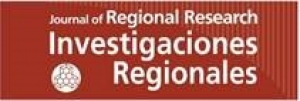Council
Elisabete Martins
3rd (online) International Conference on RETHINKING CLUSTERS: PLACE-BASED INITIATIVES FOR INCLUSIVE, INNOVATIVE AND REFLECTIVE SOCIETIES, 24-25 November, 2020
RETHINKING CLUSTERS
3RD INTERNATIONAL WORKSHOP ON CLUSTER RESEARCH (online)
VALENCIA, SPAIN, NOVEMBER, 24th-25th, 2020
We are happy to announce the online RETHINKING CLUSTERS 2020 Conference for November, 24th-25th, 2020.
Due to Covid restrictions, the Conference migrates to an online version, to keep conversation among scholars alive!!
- The deadline for paper submission has been extended up to September, 1st, 2020.
- Remember to provide at least three key words when submitting, indicating the Track you prefer.
Please, see the new Call for Papers and visit:
https://www.rethinkingclusters.org/
Those of you that already submitted, not necessarily submitting again.
Jose-Luis Hervas-Oliver and Rafael Boix, on behalf of the 3rd (online) Rethinking Clusters Workshop Organizing Committee.
Prof. Geoffrey Hewings is awarded the 2020 RSAI Founder’s medal
 Prof. Geoffrey Hewings, Emeritus Director of REAL, has been awarded the 2020 Founder’s medal!
Prof. Geoffrey Hewings, Emeritus Director of REAL, has been awarded the 2020 Founder’s medal!
The proposal, made by the committee Mark Partridge (President); Lily Kiminami (PRSCO); Andrés Rodrigues-Pose and Philip McCann (ERSA); and Dan McMillen (NARSC), was approved as suggested by the award rules by the previous winners of the same award. The RSAI Council thanks all members of both groups for their professional service and dedication.
This award comes as no surprise, given Geoffrey’s outstanding career in Regional Science.
Prof. Hewings was the founding Director of REAL and served in this position until August 2016. He obtained a B.A. from the University of Birmingham (UK) and an M.A. and a Ph.D. from the University of Washington (Seattle). Prior to coming to Illinois in 1974, he was on the faculty of the University of Kent at Canterbury (UK) and the University of Toronto (Canada).
He is also a recipient of the Fulbright and the Woodrow Wilson awards and, in 2003, he has also been nominated Fellow of the Regional Science Association International. He is also Fellow of the International Input-Output Association (since 2010) and the Western Regional Science Association (also since 2010). Geoffrey has also served as President of the North American Regional Science Council, the Regional Science Association International, the Western Regional Science Association and the International Input-Output Association.
The RSAI congratulates Geoffrey on this outstanding achievement!
Papers in Regional Science - 2019 Impact Factor
Papers in Regional Science’s 2-year and 5-year Impact Factors each increased in 2019. Additionally, the journal’s rankings in Geography and Economics improved, and its rank in Regional & Urban Planning remained the same.
|
2018 |
2019 |
|
|
2 -year impact factor |
2.020 |
2.220 |
|
5-year impact factor |
1.992 |
2.165 |
|
Rank in Regional & Urban Planning |
23/39 |
23/39 |
|
Rank in Geography |
40/83 |
37/84 |
|
Rank in Environmental Studies |
66/116 |
68/123 |
|
Rank in Economics |
100/363 |
96/371 |
NARSC Summer Speakers Series
The North American Regional Science Council is pleased to announce its 2020 Summer Speakers Series. Registration is free, but you must register for each presentation separately. The line-up of speakers and their presentation titles can be found below. For more detailed information, including presentation abstracts and presenter bios, please go to http://www.narsc.org/newsite/narsc-summer-speakers-series/.
SPEAKER 1
Title: Regional Science: Origins and Development – A Personal Perspective
Presenter: Luc Anselin, University of Chicago.
Time: Tuesday, July 14, 2020 11:00am-1:00pm (EST)
Registration Link: https://uiowa.zoom.us/webinar/register/WN_gtEBGbCGRPK518_Qs3gNxQ
SPEAKER 2
Title: Anticipating a World of Automated Vehicles: Cost, Energy, & Urban System Implications
Presenter: Kara Kockelman, University of Texas at Austin.
Time: Tuesday, July 28, 2020 11:00am-1:00pm (EST)
Registration Link: https://uiowa.zoom.us/webinar/register/WN_mseS0EtnQZaIRZNaOvetMA
SPEAKER 3
Title: COVID-19 and Implosion of Regional Economies
Presenter: Mark Partridge, Ohio State University.
Time: Tuesday, August 11, 2020 11:00am-1:00pm (EST)
Registration Link: https://uiowa.zoom.us/webinar/register/WN_6UG3FrJ3Rgmx8bVO57f6_A
Deadline extended: 27th APDR Congress, 10-11 September 2020, Angra do Heroísmo in Terceira Island, Portugal
Dear colleagues
The Annual Congress of the Portuguese Association for Regional Development (http://www.apdr.pt/congresso/2020) will be face to face and online, in Portuguese, English, Spanish and French.
Because there are urgent topics that need to be analyzed scientifically, we would like to extend participation to all regional scientists in the world who can communicate in these languages.
To make this more feasible, we postponed the abstract submission deadline to 3 July and reduced the cost of participation for participants from low- and middle-income countries.
Papers can easily be submitted to the Portuguese Journal of Regional Studies and the Regional Science Policy and Practice, in addition to being part of a well-structured edition of the proceedings of the Congress.
You are very much welcome to submit an abstract and present your thoughts.
The LOC
Tomaz Ponce Dentinho
The latest issue of Regional Science Policy & Practice is available! Volume 12, Issue 3, Pages: 369-552, June 2020
ISSUE INFORMATION
ORIGINAL ARTICLES
Institutions and the fortunes of territories [Open Access]
Andrés Rodríguez‐Pose
Peter Gordon, Karima Kourtit
Selling The Region: The Problems of a Multi‐Agency Approach in Promoting Regional Economies
Andrew Crawley, Max Munday, Rick Delbridge
Evaluating clusters: Where theory collides with practice
Madeline Smith, James R. Wilson, Emily Wise
Arun Natarajan Hariharan, Arindam Biswas
Tariff reform and income inequality in I ndonesia
Yessi Vadila, Budy P. Resosudarmo
A review and modelling on the critical management of the disaster debris of earthquake in Bhutan
Arunava Majumder, Kailash Pradhan, Satwinder Singh Danewalia, Bimal Kumar Sett
Do changes in air transportation affect productivity? A cross‐country panel approach [Open Access]
Laila AitBihiOuali, Jose M. Carbo, Daniel J. Graham
Moshe Givoni
Safwan A. Mohammed, Ali Alkerdi, János Nagy, Endre Harsányi
Kuzey Yilmaz
BOOK REVIEW
Amitrajeet A. Batabyal
In memory of Professor Börje Johansson (1945-2020)
Professor Emeritus Börje Johansson passed away in his home in Stockholm, Sweden, June 18, 2020, at the age of 74. Börje served as President of the European Regional Science Association 2000-2003. In 2013 he was awarded the EIB-ERSA Prize for his great contributions to regional science. From 1994 and 20 years onwards, he served as Editor for the Annals of Regional Science. He always stood out as a great beacon of regional science from the North.
Börje Johansson took his PhD in Economics at Gothenburg University 1978. 1982-1984 he was Acting Leader of the Integrated Regional & Urban Development Group (RUD) at IIASA, Laxenburg, Austria. 1985 he became Director of CERUM (Centre for Regional Science Research), University of Umeå. 1994 he was appointed Professor of Economics at JIBS (Jönköping International Business School), Jönköping, Sweden, a position that he kept until his retirement a few years ago. Börje also held positions as Professor in Economics at the Norwegian University of Science and Technology, Trondheim, Norway, and as Guest Professor in Infrastructure Economics at KTH, Stockholm, Sweden.
Börje’s research interests spanned over large areas of economics and regional science. He made important contributions to economic network theory and productivity analysis. He was an excellent teacher and fostered a new generation of PhD students wherever he was active. Börje also had an extraordinary ability to apply his theoretical knowledge to practical problems, and he had innumerable commissions for agencies and authorities at national and regional levels. He was always hard working and had an extraordinary scholarly and personal integrity combined with a terse sense of humour inherited from his family background in the coastal surroundings of Gothenburg.
Börje is mourned and missed by many colleagues and friends across the world, most of all by his children Eleanor, Eskil and Olof.
Hans Westlund Folke Snickars Charlie Karlsson
Professor Professor Emeritus Professor Emeritus
Postdoc Opportunity: Department of Social and Political Science at the University of Milan is recruiting a post-doctoral researcher
Postdoc Opportunity:
The Department of Social and Political Science at the University of Milan is looking to seeking to recruit a post-doctoral researcher. The position is fully funded for two years and can be renewed for a further two years.
The researcher will work directly with Professor Anne-Marie Jeannet on her ERC funded project DESPO “Deindustrializing Societies and the Political Consequences.” The aim of this project is to reveal how a person’s individual, family, and local community experiences of manufacturing decline transform the way they participate in politics and their political attitudes over the course of their life. DESPO will focus on the long-term consequences by five decades of manufacturing decline and its political aftermath (1965-2015).
The ideal applicant will be a skilled quantitative researcher that has demonstrated experience working with administrative data, managing large datasets, and data linking. He/she should also have a strong competence in geographic software (GIS), statistical software (STATA or R), and preparing documents in LaTeX. A preference will be giving to candidates who have demonstrated interest in working class politics, electoral realignment, or economic restructuring. The position is in English and knowledge of Italian is NOT required.
The position is open to candidates with a PhD with various social science backgrounds such as: sociology, political science, geography, economics, history, or similar disciplines.
The application deadline is July 8, 2020.The starting date for the position is September 1 (negotiable). Application info is available here: https://www.unimi.it/it/ricerca/ricerca-lastatale/fare-ricerca-da-noi/assegni-e-borse/bandi-assegni-di-ricerca/bando-di-tipo-b-prof-chiesi-dottssa-jeannet-id-4616
Please feel free to contact Anne-Marie Jeannet (This email address is being protected from spambots. You need JavaScript enabled to view it.) for any informal inquiries regarding the application process or the position.
NECTAR Special Session in North American Meetings of the Regional Science Association International RSAI 2020
Regional Science and Tourism in the Era of Global Uncertainty
(NECTAR Special Session in North American Meetings of the Regional Science Association International RSAI 2020)
NECTAR Clusters 5-6 Special Session
San Diego, CA, USA November 11-14, 2020
Call for papers
As part of the Annual Meetings of 2020 North American Regional Science Council (NARSC) in San Diego, CA from November 11 to 14, 2020, we would like to invite you to special session(s) for “Tourism and Regional Science in the Era of Global Uncertainty” that Nectar clusters 5 and 6 are organizing jointly with the NARSC and RSAI.
The website for submission is now open in the User Area of NARSC website (https://www.narsc.org/newsite/userarea/UserArea.php). Short abstracts as well as full papers (also in draft format) will be accepted for the Special Session.
If you are interested in presenting your research in this special session, please submit an abstract (2,000 to 5,500 characters and spaces) through the conference portal. Information on how to do that can be found here. Upon submitting your abstract, you will receive an abstract ID number (e.g. P12345). Please send your abstract ID number and a copy of your abstract to Jaewon Lim, University of Nevada Las Vegas, This email address is being protected from spambots. You need JavaScript enabled to view it., Juan Carlos Martin, University of Las Palmas de Gran Canaria, This email address is being protected from spambots. You need JavaScript enabled to view it. and Luca Zamparini, University of Salento, This email address is being protected from spambots. You need JavaScript enabled to view it. no later than June 30, 2020.
Selected full papers will be invited for publication in a special issue of the Regional Science Policy & Practice Journal, following standard review/revision procedures. (https://rsaiconnect.onlinelibrary.wiley.com/journal/17577802).
Main topic
Christaller (1964) was probably one of the first regional scientists who analysed, after the conference held in Lund during 1963, the patterns on geographical location of tourist activity. Christaller found that “It is typical for places of tourism to be on the periphery. In this way, regions economically benefit from factors which cannot be utilized otherwise: high mountain chains, barren, rocky landscapes, heather, unproductive dunes.” (p.86). Since then, the tourism industry has changed dramatically. It is not so much the activity to move away from each other but instead to be with each other visiting their places and new places, also being involved with tourists in our own places because the we, and the places we live, are nice. That is why regional science – the study of human interaction within space with sound methods – has a say that can change the scientific perspectives on tourism that often miss space and the relation with each other. Regional Science as a discipline needs to analyse multiple strategies, policies and trends that are critical for tourist destinations that aspire to position and to consolidate their image in the world-wide network of tourist destinations at different geographical levels, urban or rural, within a framework of tough global competition. However, as world is currently experiencing, the unexpected events including but not limited to pandemic contagious diseases, regional political instabilities, safety issues with terrorist attacks, make the future of tourism uncertain. Due to the increasing concerns for mobility across space with the growing global uncertainty, tourism activities are expected to get downward pressure, while the increasing demand for various types of experience in tourism destinations may boost the worldwide growth of tourism in the future.
For this reason, potential topics discussed at the Special Session include:
-
How can tourism studies benefit from Regional Science?
-
Quantitative methods of Regional Science applied to Tourism
-
Pandemic Diseases and Tourism Industry
-
Consumer Behavior & Tourism Analysis
-
From Well-Being and Happiness of tourists to Quality of Life of host residents.
-
New Directions and Paradigms in Regional Science applied to Tourism
-
From Decision Making to Travel Behavior
-
Regional Science and Hospitality Research. The notion of industrial clusters.
-
Tourism Infrastructure. Natural and Cultural Endowments
-
Tourism Flows. Place, Time and Activities
-
National and Regional Tourism and Travel Competitiveness
-
Tourism Trends. Climate Change and Sustainable Tourism
-
Tourism Demand: Demographic, Behavioral and Social Changes.
The abstracts/papers will be reviewed by the Organizing Committee and the notification of paper acceptance will be distributed by July 15th, 2020.
Organizing committee. For more information or questions please contact Jaewon Lim, University of Nevada Las Vegas (This email address is being protected from spambots. You need JavaScript enabled to view it.), Tomaz Dentinho, University of the Azores (This email address is being protected from spambots. You need JavaScript enabled to view it.): Juan Carlos Martin, University of Las Palmas de Gran Canaria, This email address is being protected from spambots. You need JavaScript enabled to view it. and Luca Zamparini, University of Salento, This email address is being protected from spambots. You need JavaScript enabled to view it.
NECTAR is a European-based scientific association. The primary objective is to foster research collaboration and exchange of information between experts in the field of transport, communication and mobility from all European countries and the rest of the world. It is a multidisciplinary social science network. It brings together a wide variety of perspectives on transport and communication problems and their impacts on society in an international perspective. For further information see: http://www.nectar-eu.eu
New issue (number 46 - Special issue on "Linkages and channels between Cohesion Policy and European Identity”) of Investigaciones Regionales - Journal of Regional Research
Volume 46 of Investigaciones Regionales-Journal or Regional Research is published under the form of a Special Issue devoted to the analysis of “Linkages and channels between Cohesion Policy and European Identity”. The volume has been coordinated by Professors Jordi Suriñach (Universitat de Barcelona) and Edoardo Mollona (Università di Bologna) and is associated with the results of the European H2020 project named PERCEIVE, being six papers related to this project, while a seventh work, the one signed by Giovanni Perucca, is associated to another EU-funded project – COHESIFY, with similar objectives and perspectives.
This issue consists of an editorial and seven other research articles. In the Editorial, the coordinators of the volume describe the search of a main better understanding of the channels through which European policies contribute to create both different local understandings of the EU and different levels of European identification across profoundly different European regions. The papers presented in this special issue display the multidisciplinary portfolio of competences and analytical methods to elicit the meaning structures in public discourse about the EU. The papers mobilize two theoretical perspectives: a rational choice and a social constructivist perspective. The former puts forward an idea of institutions as “rules of the game” and that emphasizes the calculative rationality of actors as determinants of European identities and identification, while the second stresses the idea that European identities and identification emerge from a process of “social learning” associated with different institutional discourses.
The first paper opens the special issue and report empirical research to describe the general features of the phenomena under investigation. In the paper Do Citizens Support Cohesion Policy? Measuring European support for redistribution within the EU and its correlates, Nicholas Charron presents the results of a survey that investigates how citizens feel about economic integration within the Union and what attitudes they have towards cohesion policy. Grounding on 17,200 interviews to European citizens, the survey shows the variation in citizens’ support for EU Cohesion policy between countries and describes how support varies between demographic groups. To speculate on the relative exploratory power of rational versus cultural approaches, the survey studies as well as the extent to which utilitarian and ideational factors underpin support.
The paper written by Rosina Moreno, EU Cohesion Policy Performance: Regional Variation in the Effectiveness of the management of the Structural Funds, investigates the dynamics of absorption of EU cohesion funds at NUTS2 level. The effectiveness in the absorption of funds is a crucial challenge for EU member states and this article takes an original perspective by focusing on the regional variation in the absorption of the structural funds. A dimension, this latter, that has been overlooked in previous literature. The paper suggests that full absorption is more the exception than the rule and high regional heterogeneity in the absorption of the Structural Funds is not only observed across countries but also within the regions in a country.
A review of the theoretical arguments that explain the process of creation of a European identity is provided in the article written by Vicente Royuela and Enrique López-Bazo, Understanding the process of creation of European identity – the role of Cohesion Policy. In the article, the authors discuss the grounds of mechanisms and determinants driving citizens’ identification with Europe, stressing the role of the territorial dimension on European identity formation. The authors analyse the main theoretical arguments on the construction of European identity. They also analyse the role of Cohesion Policy by confronting the concepts of spatial identities with a historical perspective of the European project. Finally, they inspects the role of European institutions by providing some basic figures on the regional expenditure on Structural Funds and its association with the awareness, support and identification with the EU project
In their paper, Profiling identification with Europe and the EU project in the European regions Cristina Brasili, Pinuccia Calia and Irene Monasterolo investigate to what extent do EU citizens identify with Europe and the EU project, whether European regions have different patterns and level of identification and what, if any, is the role of socio-economic variables. The authors develop a novel probabilistic classification model, IdentEU, and use micro-level data from a survey implemented within the PERCEIVE project. The reported empirical research reveals that trust in the EU institutions, the effectiveness of EU Cohesion Policy and spending, and the level of corruption are three relevant drivers of citizens’ identification with the European project.
To conclude the group of papers addressing the formation of EU identity, the paper by Giovanni Perucca. When Country Matters More than Europe: What Implications for the Future of the EU? studies the determinants of the imbalance between the identification of a citizen’s with her/his country, on the one hand, and with Europe on the other. The work reported in the paper moves off from noting how recent empirical evidence shows an increasing imbalance in favor of the identification with individuals’ country of residence. This phenomenon, the author suggests, may be connected with the increasing support to nationalisms and Eurosceptic parties almost everywhere in the EU. The results presented, based on a panel data model using data from five Eurobarometer survey studies conducted between 2014 and 2017, suggest that individuals with lower education and income, and those living in the lagging-behind regions of the EU, are more likely to identify more with their own country than with Europe. Thus, the paper supports the hypothesis that unequal distribution (among individuals and regions) of the benefits from EU integration is a determinant worth considering of the emerging antagonism between European and national identity.
A second thread of investigation reported in this special issue addresses whether and how the communication strategies of Cohesion policy affect the perception of the policy and the identification with the EU.
In their paper, Luca Pareschi, Edoardo Mollona, Vitaliano Barberio and Ines Kuric (The use of social media in EU policy communication and implications for the emergence of a European public sphere) analyze cohesion policy communication on social media of ten Local Managing Authorities (LMAs) that manage structural funds at the local level and communicate to stakeholders information concerning Cohesion Policy. The authors use semi-automatic text analysis techniques to elicit shared meaning structures as they emerge in the discussion on social media. The aim is to understand whether an European public-sphere exists in which a shared EU identity can emerge. The reported results show the emergence of an internationally articulated cluster of topics that showcase a negative attitude towards the EU funding scheme and a generally skeptic attitude towards the Europe Union. This fact suggests that, counter-intuitively, Euroscepticism seems to facilitate, and be inflated, the emergence of a European public sphere.
The paper by Giovanni Cunico, Eirini Aivazidou and Edoardo Mollona (European Cohesion Policy performance and citizens’ awareness: A holistic System Dynamics framework) integrates the analysis of implementation and communication. Namely, based on the interviews to policy-makers, stakeholders and beneficiaries of cohesion policy, the paper develops a holistic qualitative framework that elicits the causal structure underpinning the distribution of the Cohesion Policy funds, the impact on projects’ quality of the management capability at local managing authority level, and the related, communication processes. The authors developed the qualitative causal model with the aim at stimulating a focused discussion on Cohesion Policy. The motivation behind this modelling effort is to provide policy-makers, stakeholders and scholars interested in Cohesion Policy analysis with a conceptual tool able to elicit the interconnections among the key processes at work and, more specifically, between the dynamics of funds absorption, policy communication and the mechanisms that produce awareness about the policy.
This issue has been sponsored by the Directorate General of Community Funds and co-financed by the ERDF (European Regional Development Fund).
About Us
The Regional Science Association International (RSAI), founded in 1954, is an international community of scholars interested in the regional impacts of national or global processes of economic and social change.

